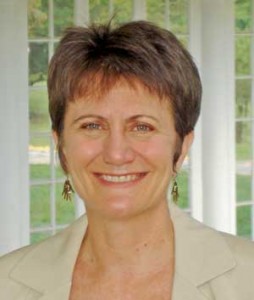“I think I have a meditation disability” Donna Jackson Nakazawa
Donna’s going to start her year of using mind/body techniques and acupuncture to return joy to her life (and hopefully improve her health) with an 8-week mindfulness-based-stress-reduction (MBSR) course.
First, though, she’s going to have a private meeting with a meditation instructor. It’s a good idea. She’s a bit of a mess, actually. Her mind is racing, she’s beating herself up constantly, she can’t calm down; in short, she thinks she’s probably about the last person that would benefit from this approach. She could use a little extra help.

Meditation and mindfulness techniques helped Trish Magyari dig her way out of ME/CFS/FM 20 years ago
Her meditation instructor turns out to have an interesting past. Twenty years earlier Trish Magyari turned to mind/body practices after being struck by chronic fatigue syndrome/fibromyalgia. A young, single mother working ‘impossible hours, her health bit by bit began to fall apart. First, she stopped working full-time and then part-time and then working altogether.
Overwhelmed by pain, she turned to mind/body practices. As they helped her to ‘occupy a less reactive mental space’ she slowly began to dig her way out. By 1999 she was working full time again. She still has problems with fatigue, but they’re on a different level than before.
Since then, she’s become a senior Mindfulness Based Stress Reduction (MBSR) instructor, a clinical counselor is on the Johns Hopkins faculty, and has worked with Ehlers Danlos syndrome and rheumatoid arthritis patients to lower their stress and anxiety levels and sometimes pain as well.
She’s seen MBSR bring some people physical breakthroughs while others are happy to get the emotional relief and improved quality of life they bring. Maygari noted that once people are able to build a different relationship with their pain and disabilities they’re often empowered to move on and take up challenges they’d put off.
Donna’s not so sure about herself. Her lab tests and diagnoses aren’t the only ‘alp’ she has to climb. With her mind churning out negative and worried thoughts at about 150 miles an hour, she’s concerned that she may have a ‘meditation disability’.
Retraining her brain with its miles of faulty wiring is probably a mountain too high to climb, she thinks. Neuroplasticity is one thing, but we’re talking about major, major rewiring here. This may be impossible, she informs Trish.
This is the Donna who, after finding that the door lock on her car didn’t work that morning, spilled her water all over herself. Then she was late to the appointment. Then her daughter called in the middle of her appointment. All the while the term “what an idiot” rang in her head again and again.
To which Trish, with a smile, replied that maybe working on being more friendly to yourself would be a good first step. Trish suggested she meet that judgment by naming it and, as Donna takes a deep breath, listens to the tingsha meditation bell, and names her ‘self-judging’ mind when it arises, she finds that it quiets down and she feels a calmness she hasn’t felt in a while. By the end of the meditation she’s smiling.
A Meditation Disability?
This is all interesting to me because I think I may have a ‘meditation disability’ as well. Before getting chronic fatigue syndrome (ME/CFS), and before I knew anything about meditation, I regularly engaged in meditation-like practices, but those mostly went out the window post-ME/CFS. The rewards just weren’t there anymore.

Donna’s mind – rushing at what feels like 150 miles an hour- suggests to her she may have a ‘ meditation disability’
I’m not alone. Toni Bernhard engaged in extensive meditation practices pre-ME/CFS but found them much more difficult post-ME/CFS. If I’m reading her right, she now uses more mindfulness exercises than meditation exercises.
- Mindfulness – Potent Medicine For Easing Physical Suffering – Toni Bernhard
- Seven Myths about Mindfulness – Toni Bernhard
Some research backs this up. The mental fatigue in ME/CFS makes it more difficult for them to engage in tasks requiring ‘sustained attention’. They have reduced attentional capacity and have to exert more energy and use more sections of their brains to process outside stimuli. Their brains also have trouble shutting off attention to innocuous outside stimuli – a key feature of meditation.
These problems appear to be physiologically based. A recent study suggesting that ME/CFS patients with worsened muscle recovery times have worse cognitive functioning, and tied muscle functioning to cognition. Another study indicating that cognitive defects are associated with enhanced sympathetic nervous system functioning (low heart rate variability) linked them with problems with autonomic nervous system functioning. A fibromyalgia study suggesting problems with blood pressure regulation may be associated with poor cognition did the same.
Meditative practices probably are more difficult in ME/CFS and Fibromyalgia than in healthy people, but that doesn’t mean they may not be helpful. Numerous studies have shown these practices tend to push the body in the direction toward reduced sympathetic nervous system functioning and enhanced parasympathetic nervous system functioning that could be helpful.
Donna’s not optimistic regarding her ability to use meditation or mindfulness exercises to tame her ‘reactive mind’, but here she is.
Homework
Donna’s homework is to read
(a) Read a book called “Radical Acceptance” by psychologist and meditation expert Tara Brach.
(b) Work on being more friendly to herself.
(c) Think back on how she coped with the big stressors in her childhood and how she learned to relate to herself in the face of them.
- Check out more “Last Best Cure” blogs as we chart Donna Jackson Nakazawa’s efforts to return to joy and improve her health in the midst having an autoimmune disorder and other afflictions.
__________________________________________
Donna Jackson Nakazawa is a science journalist, author, and public speaker. She tweets often about breaking medical news. Follow her tweets and check out her Facebook site and website and blog.
She is the author of the The Last Best Cure, The Autoimmune Epidemic, and Does Anybody Else Look Like Me? A Parent’s Guide to Raising Multiracial Children as well as a contributor to the Andrew Weil Integrative Medicine Library book, Integrative Gastroenterology, (Oxford University Press, April 2010).
Among others she is the recipient of the 2010 National Health Information Award, the 2012 international AESKU Award from the International Congress on Autoimmunity for her lifetime contribution to autoimmune disease research with the book The Autoimmune Epidemic.








”Numerous studies have shown these practices tend to push the body in the direction – towards reduced sympathetic nervous system functioning and enhanced parasympathetic nervous system functioning – that could be helpful”
This is the keyproblem in ME for a subgroup. Autonomic overdrive, but we have to know why? It can be for compensation.
EEG Neurofeedback can help some of the gross manifestations of sympathetic overarousal, racing mind, etc. It might not (or might!) be a cure-all, but even a small improvement in reducing excess fast wave function (which is what’s most often behind these kinds of issues) can make a big difference, even enabling you to meditate again.
Think of a car stuck in neutral – but with the foot down hard on the accelerator. It tends to burn you out, and you also don’t get anywhere. If you can get the foot to ease up on (and finally off) the gas pedal, you can then much more easily put the car in gear and start to drive again. EEG NF can help retrain the brain to reduce those overdriving frequencies and give you a chance at meditating. GL!
Thanks Jeff – I’d never heard of that before. It sounds promising. I’ll check it out.
I recently purchased an “inner balance” device from Heartmath. You plug it into your computer and put a clip on your ear and it gives you feedback as to which of 3 states of coherence you are in. There are 4 challenge levels. They also have something called an “Emwave.” You can check it out on Heartmath.com if you’re interested. Course, you’ve got to use it – I’m slacking lately.
Thanks – lots of interesting tools to use. Please let us know how it works for you.
I guess I have a meditation form of healing I have been using with my Fibromyalgia for years. I am a Christian and believe there are 2 reasons for suffering that God be glorified by the healing or we share in Christ’s glory by suffering. A little girl who writes poetry calls it being a broken dove and that heaven taking pity on it opens it gates to those the dove carries through, she says God inspired her poetry. I like the analogy. I just know that prayer is my deep meditation. I offer my pain to the Father as a gift. Then I pray for others on and on or I pray my love for Him, before long I no longer feel my body but a cocoon of weightless warmth sometimes it lulls me to sleep but even then I pray. Funny a voice will tell me to wake because I could stay there forever, like yesterday, the voice said Get up it’s 6:00. Sure enough, it was 6, and my husband had been trying to call me. I had laid down at 3 in terrible pain when I woke, I felt great. I know it sounds crazy to those who don’t believe, maybe to those who do. But this is my gift and it doesn’t fail me.
It may be a tradition of the Prophet Mohammed, but it is a Muslim saying regardless: “Prayer is better than sleep.”
Your post also reminds me of the practice of Tonglen, a Tibetan Buddhist practice in which (in one version) you accept your pain and also accept everyone’s pain – take it all into yourself – with the wish to relieve the pain of others. It’s kind of the opposite of the usual, “breathe out the bad, breathe in the good.” Rather you breathe in all the pain of the world (or start smaller – the pain of others like you) and breath out, sending wishes of peace and bliss. I like this because it feels like my pain can serve a purpose, if only I could take on all the pain of the world, I would not mind my own pain, if it relieves that of everyone else!
I envy your ability at prayer!
Vlynx,
This didn’t happen overnight. I went through a period of extreme depression where I felt because of Fibromyalgia I had lost my life. I had a job as a Family Support Worker with Save the Children that helped young women become better mothers, I went into their homes looking for their strengths and building relationships so that over time whatever it took I would assist and encourage them to better their quality of life, get off government assistance, be strong, independent and often times letting go of negative relationships. Then after 16 years my body rebelled. I worked till my husband had to come get me literally and take me to the Doctors in a wheelchair. Fight or flight, didn’t know we got a choice. But I felt suicidal, I couldn’t pray, I had no words, so I read the Psalms over and over. My counselor told me to journal. So I wrote letters to God and as I wrote He spoke. Worried my counselor at first, but His words were not my thoughts wise, kind, comfort, love, funny, and He told me Fibromyalgia would be my blessing. My prayers grew deeper, and one day I woke up and everything was brighter, I felt a new joy and purpose, I could be content healed or not. I could help others like me, pray for their healing, or easement and be a living sacrifice and Fibromyalgia became my blessing.
Powerful stuff Deborah. Thanks for sharing it.
Over the years, since I haven’t been able to meditate very well, prayer has become an important practice for me. I figure if I can’t do anything else for anyone, at least I can pray!
Sounds like hocuspocus, the big problem I have with this is that it take a large amount of cognitive energy to meditate. Concentration isn’t free.
Whoever, if it works for some then that’s a win.
Well, this article has really got me thinking.
I started meditating with TM in 1978.
In 1980 I met Swami Muktananda, and lived in one of his ashrams (in Ann Arbor, Michigan) on and off for several years. I stayed in that meditation group, Siddha Yoga(TM) for 17 years. I pursued meditation, chanting, and other practices ardently.
As some of you reading this may know, Siddha Yoga(TM) had a fair number of scandals over the years. I concentrated on doing the practices and, right or wrong, tried to ignore most of that. Finally, news from several fronts made me conclude that the group was becoming far too cultish and destructive. I left in 1997.
Now that I’m thinking about it, right about then, my health really took a turn for the worse.
I have always had iffy health, but it seemed that I could manage somehow. I could keep a job if they didn’t fire me over too many absences. I was studying Chinese medicine and working part time. My attendance at school was also sporadic; it was taking me too many years to complete my degree. In 1999, I finally had to quit school and work. It was my interning year. I’ve been disabled and unable to work ever since.
My symptoms were so varied and elusive, it took 15 years to get some good working diagnoses. Celiac disease, Ehlers-Danlos Syndrome (hypermobile type), fibromyalgia, ME/CFS, narcolepsy, neurally-mediated hypotension, and Hashimoto’s thyroiditis, to name a few. (Yes, one of my docs has noted that I did not win the genetic lottery this time around.)
Needless to say, my formerly excellent concentration, honed by years of mindfulness and meditation, was completely borked. My memory has never been great, and it got much worse. It is kind of neat, though, that I can read something or watch a movie, then read or watch the exact same thing again and it will be almost completely new to me again. So hey, it wasn’t all bad, I guess.
One of the things I did to try to hold on to some benefit of my practices was to buy and use a light-sound machine. The type I purchased was a Proteus from mindplace.com (http://www.mindplace.com/). I have been using it for years, an hour of delta stimulation every morning (program P11, one-hour meditation.) I think it really has done a lot to help me hold on to some of my mindfulness. It’s almost like I’m forcing my brain to meditate, since I can’t do it by my own volition any more.
After many years my docs and I worked out diagnoses, and I’ve finally got some treatments that really work for me. I lost 90 lbs. and have kept it off over a year. I have much more energy these days, and my concentration has improved to the point that I can actually read a novel again. (I just finished my first novel in several years, “A Song of Ice and Fire”. It was great! I’ve missed reading like missing a limb.)
Last night I learned that an ‘Net friend lost her husband after a long and grueling illness. I immediately resolved to chant for him. For the first time in years, I spent about two hours chanting. It was such a wonderful, deep, restorative experience. I learned some things about the mantra that expanded my understanding of it immensely. It was a beautiful and blessed experience; it felt like the practices and Kundalini Devi were welcoming me back.
This morning I simply felt burned out, and I’ve been spacey and listless all day. I think I did too much yesterday, practices-wise. Oops. Now comes finding the balance, always a tricky bit of business. Once I know how much I can safely resume without making my health worse, I’ll restore the practices I can back into my life.
Ah, I can sense that some may be wondering how meditation can make my health worse. Hm, how to explain? The meditation energy moves very strongly in my body, and can really tax my energy and sending me flaring. It doesn’t happen this way with everyone. It’s because I pursued meditation and other things in a very intense way — in a sense, I’ve asked for it. Now I just have to make sure I don’t burn up in the fire of the practices.
I could write tons and tons more, but I think I have to just go off and ponder some more. I’ll also ponder the “coincidence” of seeing this article the day after my experiences last night. Hmmm.
Thanks for passing this on, Cort.
Hi Mark
Yuan Tze, a qigong teacher is one of the few I know of who warns about sitting meditation (in his book ‘Voyage to the shore, three parts). Have you ever tried to replace meditation with a practice like yoga or tai chi or qigong?
meditation gives me headaches
I really like Lisa Esiles take on meditation, though I also use counting breaths, metta etc. Lisa also has a really good blog on anxiety and a book on 7 secrets your mind doesn’t want u to know (which is so easy and free to read online if you can read this, you can read it) – she’s another me/cfs recoverer. )
http://lisaesile.com/the-weird-story-of-my-year-of-silence-and-finding-inner-peace-plus-a-lazy-persons-guide-to-meditation/
What I like about her approach is the assumption that we are ok underneath it all and just need tolearn to be aware or our minds. Its too hard to rewire when you’re sick! My mantra is, ‘the you that is you is ok’
Xo
I find meditation very helpful though I recognize what she describes. I learned open eyed down to earth meditation before I got ill and even though it is harder to focus now it does help me tremendously because it brings more moments of reflection and inner peace in a day to day life even if I’m to ill or scattered to actually sit for meditation for prolongued times. It’s important to find a way that is fitted to your personal needs which are different for everyone. I practise the one that is thaught on http://www.learnmeditationonline.org which doesn’t require any specific body posture or anything so can be practised lying down to. If you are able to visit them they also have centers in over 130 countries where they teach meditation free of charge as a community service. What helps me a lot when the mind is racing is to listen to meditation commentaries on a headset, even if I can’t focus at all it still helps me have a few more supporting thoughts, and that can make just the difference between getting emotionally overwhelmed because of all the physical discomfort and chaos or being able to stay balanced whilst in the mids of chaos.